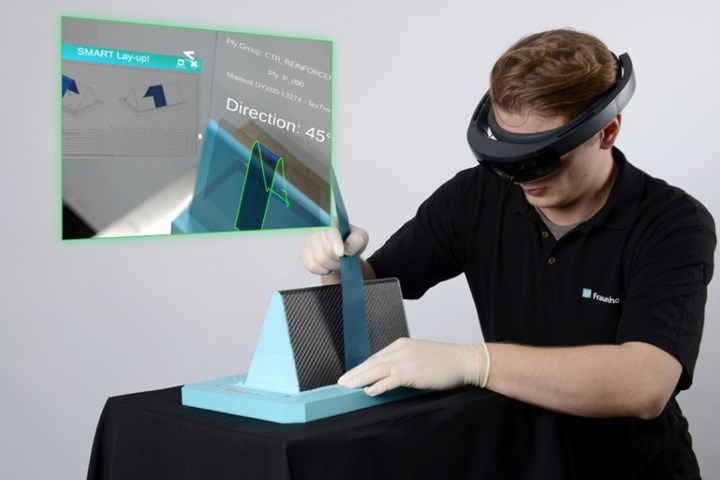Augmented reality system facilitates FRP component preforming
The software makes exact alignment and position of materials directly visible on the component.

Source | Fraunhofer Institute IPT
To support the manual deposition process of semi-finished fiber-reinforced materials, or preforming, the Fraunhofer Institute for Production Technology IPT (Aachen, Germany), research partner with AZL Aachen, GmbH (Aachen, Germany), has reportedly developed intuitive software for commercially available augmented reality glasses. According to the institute, the system specifies the correct deposition of semi-finished materials as a virtual representation on the mold, enabling improvement of the quality and performance of composite production processes.
Compared to information on the position and orientation of the fiber layers provided by plybooks or laser-based support systems applied in larger industries, IPT notes that its augmented reality software uses smart glasses to make the exact alignment and positioning of the materials directly visible on the component. IPT says the cutting of the semi-finished materials is also supported by projection of target contours. Step-by-step instructions guide the worker through the preforming process and, if required, document the work for quality assurance purposes. Overall, IPT considers it a much more flexible and cost-effective system than conventional procedures — the acquisition of the system costing less than a tenth of the laser projection systems — is fully scalable, making it suitable for the serial product of FRP products, and that the software can be easily installed as an app on data glasses with an Android operating system and can be adapted for the lay-up task in hand.
Further, the software reportedly improves the accuracy and traceability of the processing of components made of fiber-reinforced high-performance materials, reduces the error rate and significantly shorten process times.
Companies that want to assess the technology can now test the app in a feasibility study with their own production staff and identify individual requirements in collaboration with Fraunhofer IPT employees. IPT notes the feasibility study includes researchers presenting a demonstrator system consisting of a Microsoft HoloLens with the developed software on a mobile test stand for hand lay-up on the site of the client. For more information, contact the Fraunhofer IPT.
This post is courtesy of the CompositesWorld and AZL Aachen GmbH media partnership.
Related Content
-
Compcut features ACS, PCR composite cutting technologies
Advanced plate saw and precision router provide precise, fast and efficient cutting of composite test specimens.
-
Fiberglass Cutting Operation at Hubbell’s Lenoir City Plant Moves to Automation
Automating fabric cutting operations saves Hubbell Lenoir City money and can produce composite products faster at less cost to support infrastructure expansion.
-
State-of-the-art composites cutting, machining solutions ensure accuracy, ease of operation
JEC World 2024: Compcut is presenting its advanced composites saw (ACS) and precision composite router (PCR), in addition to inviting attendees to bring their own materials for demonstration purposes.
















